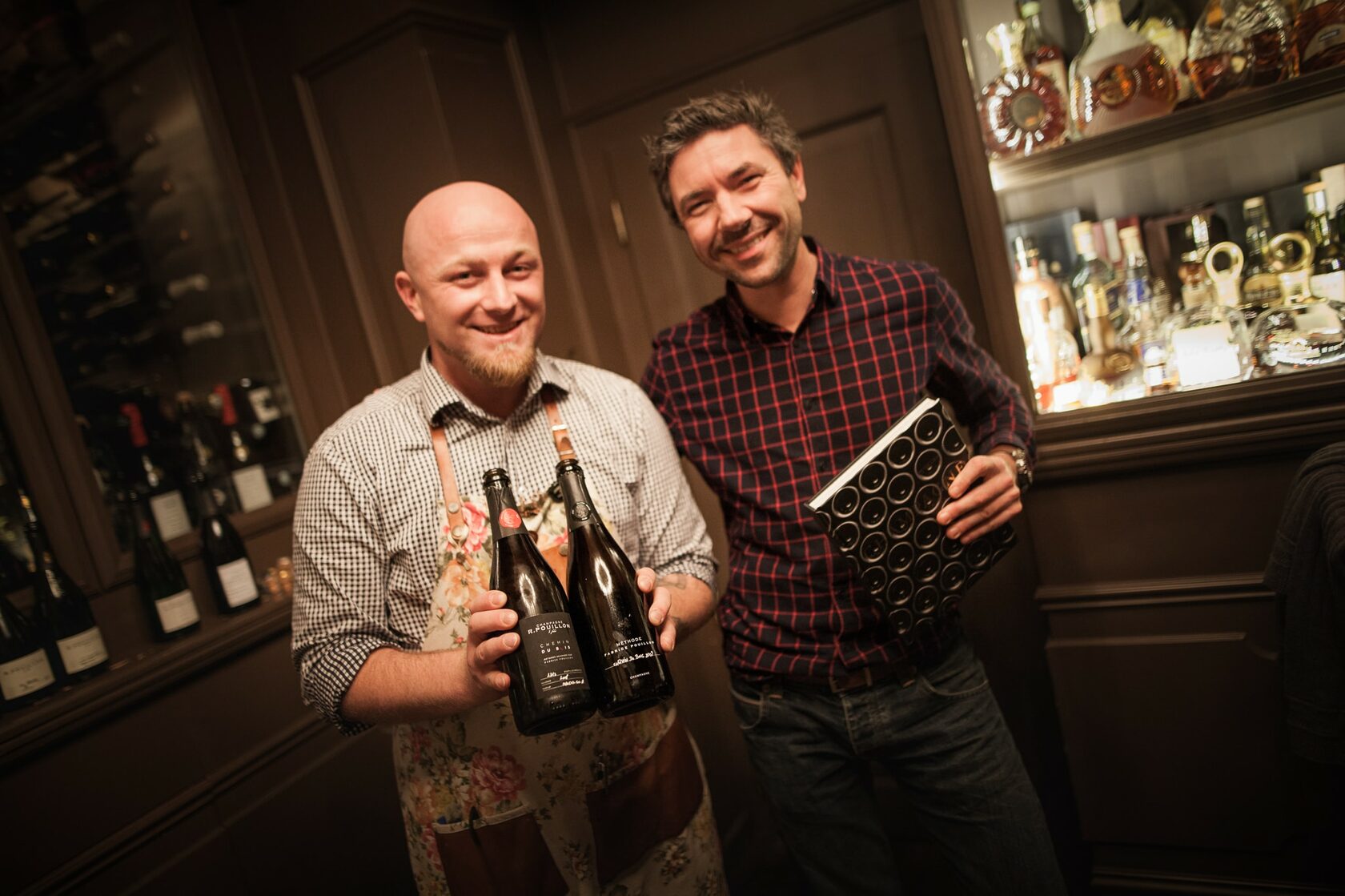Leave your phone number and we will contact you!
Or you can call us yourself:
+380 67 502 9921

History of Fabrice Pouillon
.
- Champagne regionVallee de la Marne
Villages - Ay, Mareuil-sur-Ay, Avenay-Val-d'Or Epernay, Taxière-Moutry - Cultivated grape varietiesPinot Noir | Chardonnay | Meunier
- ViticultureIn 2003, he began working on the transition to organic viticulture, including compost management, sprinkling with herbal "teas".
Fabrice Pouillon.
WINEMAKER WITHOUT COMPROMISE
WINEMAKER WITHOUT COMPROMISE
The Pouillon family has been growing grapes in the region for over a century, but it wasn't until 1947 that Fabrice's grandfather, Roger Pouillon, decided to produce wine from his estate, along with his wife, Bernedette, and uncle, Louis Bolan, a well-known winemaker and consultant in the region. The estate continued to grow over the following decades as the vineyard contracts expired, allowing the family terroirs to return to the Pouillon estate. James Pouillon, Fabrice's father, joined the firm in 1964 and upgraded the basement with enamelled tanks and grease pallets. Fabrice joined his father in 1998 after earning a degree from the School of Business and Oenology, and he took the winery in an exciting new direction. Working in the grand cru of Ay, as well as in the Vallee de la Marne and Mount Reims, Fabrice creates articulate, expressive, terroir-based wines with intense aromas and complex flavors.
FABRICE POUILLON.
WINEMAKER WITHOUT COMPROMISE
WINEMAKER WITHOUT COMPROMISE
The Pouillon family has been growing grapes in the region for over a century, but it wasn't until 1947 that Fabrice's grandfather, Roger Pouillon, decided to produce wine from his estate, along with his wife, Bernedette, and uncle, Louis Bolan, a well-known winemaker and consultant in the region. The estate continued to grow over the following decades as the vineyard contracts expired, allowing the family terroirs to return to the Pouillon estate. James Pouillon, Fabrice's father, joined the firm in 1964 and upgraded the basement with enamelled tanks and grease pallets. Fabrice joined his father in 1998 after earning a degree from the School of Business and Oenology, and he took the winery in an exciting new direction. Working in the grand cru of Ay, as well as in the Vallee de la Marne and Mount Reims, Fabrice creates articulate, expressive, terroir-based wines with intense aromas and complex flavors.
Fabrice Pouillon
Fabrice Pouillon dedicated himself to the vitality, energy and health of his vineyards. In 2003, he began his work on the transition to organic viticulture, and today he incorporates biodynamic principles into his work, including managing compost, spraying with herbal "teas" and applying procedures 500 and 501. Currently, he uses only organic compounds as fertilizer, pheromone blend for pest control, cover crops to restore soil nutrients and plow in alternating rows to keep vineyard competition and soil aeration despite varying growing conditions. He is also a member of the Lutte Raisonnée.




Fruits are hand-picked and transferred to an old wooden pneumatic press. The juice then falls by gravity into enameled iron fermentation tanks. The wines are aged in stainless steel barrels and old oak barrels and barriques, where everything goes through a complete milky-apple fermentation. Reserve wines are aged up to 18 months in 700-liter oak barrels. There is also a stainless steel solera with wines from the late 90s. The result is electric, terroir wines with intense aromas, crisp acidity and incredible longevity. These are wines that are light to the touch, yet have a depth and intensity that unfolds with every sip.
A fabulous space for self-expression
Pouillon's vineyrds are in Ay, Mareuil-sur-Ay and Aven-Val-d'Or in Grand Vallee, Epernay and Festigny along the Marne River, and also in Taxière-Moutry, north of Mount Reims. Pinot noir (3 ha) is the most planted, followed by Chardonnay (2 ha) and Pinot Meunier (1 ha).
The most exciting recent changes to Champagne Pouillon are the introduction of individual cuvées, including the upcoming release of tête de cuvée 2008 Chemin du Bois.
The most exciting recent changes to Champagne Pouillon are the introduction of individual cuvées, including the upcoming release of tête de cuvée 2008 Chemin du Bois.
THE GREATEST WINES ARE FORMED IN THE VINEYARD:
- Regular tillage, conservation of site ecosystems, use of natural farm compost. We believe that living wines can only come from living soils.
- Compliance with the biological rhythms of the vineyards, short pruning, limiting yields. We believe that grapes should concentrate the maximum mineral elements of the terroir.
- Hand-picked in small boxes, waiting for the grapes to reach full fragrant maturity. We believe that the key moment has come when all the mineral elements, the building blocks of aromas, have passed from the terroir to the grapes.

